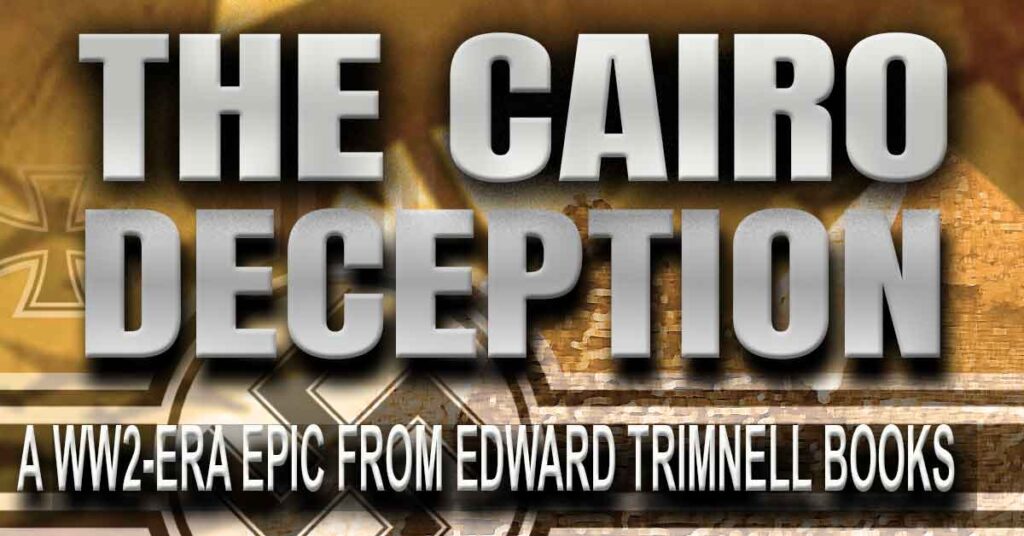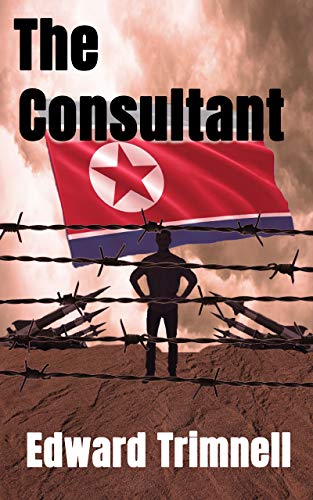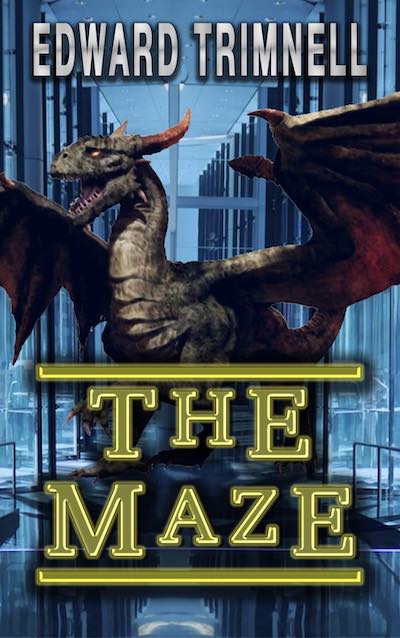Evan Daley would later reflect that he should have known better than to enter the Maze. After all, his coworker and sort-of mentor, Hugh Jackson, had tried to tell him about the Maze, and Hugh had tried to tell him that the Maze was probably dangerous.
But how do you take seriously a warning issued in a McDonald’s on a bright, warm, September morning?
Besides, before Evan saw the Maze, he would have sworn that he dreaded nothing so much as Amanda Kearns, his boss.
Evan and Hugh occupied a table in one corner of the McDonald’s dining room. The McDonald’s was located just off I-71—the interstate that would take them to this morning’s sales presentation. The restaurant was filled to near capacity this late in the morning—mostly with truck drivers and other business travelers.
Evan was digging into his Big Breakfast with Hotcakes. He felt a little guilty, eating this artery-clogger in front of Hugh. Hugh was contenting himself with a low-fat, sensible bowl of Fruit and Maple Oatmeal.
As Evan forked a mouthful of pancake, he noticed Hugh staring down jealously at his syrup-smeared Styrofoam plate.
“Sorry,” Evan said. “I’m eating a mountain of delicious fat and cholesterol here, and you’ve got to eat that bowlful of grain and berries—or whatever that stuff is.”
Hugh Jackson had a hereditary heart condition. Evan didn’t know the details, but Hugh had told him that his father had died while still in his mid-fifties. Hugh was already close to that territory himself. He therefore had to count his daily fat and cholesterol intake in milligrams.
The older man smiled back at Evan, though. “Just because I’ve got a bum ticker, it doesn’t mean that you have to suffer along with me,”
Amanda’s coffee sat steaming in front of her empty chair. Amanda was out in the children’s playground area, talking intensely into her cell phone, her outrage visible. Evan could see her from where he sat: Her long, slender body was leant against a plastic blue slide. The slide was topped with a dome fashioned to resemble a McDonald’s hamburger.
Evan discretely gestured toward Amanda. “She talking to Oscar, you think?”
Hugh nodded ominously. “It would appear so.”
Amanda had sat down with them initially. Within a few minutes, though, her cell phone had rung. After a clipped, moody hello into the phone, she had immediately stood and headed outside, where she could talk privately.
They both knew that Oscar was Amanda’s boyfriend. They also knew that the relationship had been less than harmonious of late.
Oscar was a big shot in one of the investment banks headquartered in Cincinnati. Oscar had accompanied Amanda to the Merlesoft holiday party last December, showing up overdressed in a Brooks Brothers three-piece suit.
Evan had talked to Oscar for all of five painful minutes. The investment banker made a few snide, clipped remarks about Evan’s choice of college major—English literature. Apparently Oscar—a finance wizard with an MBA from Wharton—didn’t think much of folks who elected to spend their undergraduate years dissecting The Canterbury Tales and the collected short fiction of Ernest Hemingway.
I can’t blame him, Evan thought, recalling his brief and mostly humiliating exchange with Oscar at the holiday party. I should have majored in something more practical. What the hell am I doing with my life—an English literature major working in software sales?
It was a question that he had asked himself many times over the past twenty-odd months, since he had started work at Merlesoft. This was his first “real” job—that is, his first post-college job. The corporate politics at Merlesoft were baffling and unrelenting. Evan, furthermore, struggled to pass himself off as a software guru during customer presentations.
And finally, there was Amanda, who seemed intent on riding his ass all the time.
Amanda. Damn Amanda, he thought.
And damn Oscar for doing what he was doing right now—whatever was causing his relationship with Amanda to go south. When Amanda fought with Oscar, she became even more critical of Evan.
“Anyway,” Hugh said, changing the subject away from breakfast. “I want to warn you about something. In fact, I really need to warn you about something.”
***
Evan could tell immediately that the older man intended to broach some topic of considerable magnitude. Probably something related to this morning’s sales presentation.
Today’s clients—the attorneys of the law firm Rich, Litchfield, and Baker, were a stodgy, hard-to-please lot. Hugh had made the preliminary sales call by himself and had reported as much.
The accounting software packages that Merlesoft sold were expensive, and required a client company to reconfigure a considerable portion of their internal accounting procedures. The sales process was therefore a multistep one—usually beginning with an exploratory sales call, followed by several quotations, and multiple customer consultations over the phone.
They had been going through this back-and-forth with Rich, Litchfield, and Baker for the better part of four months. Evan had yet to visit the clients’ office; but he had talked to several of the law firm people over the phone.
Today would be the final dog-and-pony show, which would hopefully result in a purchase order from the law firm. Amanda, Hugh, and Evan would make a PowerPoint presentation and answer any remaining customer questions. This was the whole purpose of making the two-hour drive from Cincinnati to Columbus today. It was “do or die” now, in the typically hyperbolic language of corporate culture.
As Evan contemplated this morning’s meeting—barely an hour in the future—he felt more like dying than doing. Amanda had given him a “challenge”, announcing that he would be making the sales presentation solo.
Evan knew from experience what this actually meant: Amanda would vigilantly wait for him to make the slightest mistake or omission. Then she would pounce and interject during the middle of his presentation, throwing him off his rhythm and undercutting his credibility in front of the customers.
“You don’t have to warn me,” Evan said, anticipating the nature of Hugh’s advice. “I know that Amanda is going to be watching me like a hawk today, waiting for me to make the slightest flub-up, or to forget the smallest detail. That’s why I’ve crammed for today’s presentation. I stayed up till midnight last night going over everything. First I reviewed the four quotations we’ve submitted up to this point. Then I went over the procedures that Rich, Litchfield, and Baker use in their accounting process at present.
“And I didn’t stop there, let me tell you. I also made a list of questions that I could reasonably anticipate them asking today; and I think that I’ve got every one of them nailed. You ought to see the notes I prepared, Hugh: They fill a good ten pages on a legal pad.”
Evan finished off the last of his breakfast, wadded up his napkin, and dropped it onto the Styrofoam plate. He smoothed his tie to make sure that it contained neither syrup, egg fragments, nor sausage crumbs. Noting also that the sleeves of his white dress shirt were free of stains or debris, he nodded at Hugh with a cautious air of self-contentment.
“You can feel free to offer me any last words before the wedding, though, buddy. Or you can hit me with any questions that you think I might have missed. But I believe that I’ve got them all down.”
Hugh leaned forward. “That’s not what I want to talk to you about, Evan. It’s something else.”
***
“What, then?” Evan was suddenly alarmed by Hugh’s expression. The older man sometimes let him know when a shake-up was imminent at Merlesoft: a firing, a promotion, a resignation, or a reorganization.
Evan had also discovered that most of these changes ended up being disagreeable in one way or another. This was yet another rule that he had learned during his slightly less than two years of corporate life: The devil you know is always less objectionable than the devil you don’t know.
Or, to put it another way: Change is usually bad.
“Don’t tell me you’re transferring to another department, Hugh,” he said. “Or—wait a minute—you aren’t leaving the company, are you?”
Hugh shook his head. “No, no. Nothing like that.”
“Well, what then?”
Hugh dropped his plastic spoon into the little plastic container in which his Fruit and Maple Oatmeal had been packaged. “This is going to sound a little strange to you, but I’m going to tell you, anyway.”
“Hugh, I’ve learned to accept things that are strange—especially since Amanda entered my life.”
Evan allowed himself another quick glance at Amanda: She was still outside, still talking to Oscar. By the look of her facial expression, the phone call definitely wasn’t going well; and that would only mean a more difficult morning for him. Amanda would have to wrap up the call pretty soon, though, troubles with Oscar notwithstanding. Otherwise, they would arrive late for their nine o’clock appointment at the lawyers’ office.
“I know you haven’t been to the Rich, Litchfield, and Baker office yet,” Hugh continued. “It’s located inside this place called Lakeview Towers—a huge office complex with hundreds of individual offices that are rented out.”
Evan had no idea of what Hugh might be getting at with this line of explanation. He didn’t want to be rude, though.
“No, Hugh, I haven’t been there,” he acknowledged. “But I’ve given presentations at unfamiliar locations before. It shouldn’t be a problem. I’m green, but I’m not that green.”
“That isn’t what I’m getting at.”
“Well then, exactly what are you getting at?”
Hugh paused and looked around, probably to make sure that Amanda was still outside talking to Oscar.
“Well,” Hugh began, “let’s just say that you ought not allow yourself to get too far off the beaten path at this Lakeview Towers. What I mean is, don’t go wandering around unnecessarily.”
***
Evan had no idea what to make of Hugh’s advice. Did Hugh think that he was some kind of a child?
This sounded like the sort of thing his mother would have said years ago—on the few occasions when his mother actually noticed his existence. She would have told him to stay close while they were out at the shopping mall—not to stray away from her protection.
But why would his colleague say something like that now? He might be the youngster on the team, relatively speaking, but he was still an adult.
“What the heck are you getting at Hugh? Would you care to elaborate?”
Hugh gave him another pause, as if weighing whether or not he should reveal some crucial but sensitive bit of information. Then he was suddenly distracted by something behind Evan’s shoulder, toward the main entrance of the McDonald’s.
“Amanda’s back,” Hugh muttered discreetly, in a barely audible voice.
Amanda’s sudden reappearance meant that the explanation of Hugh’s cryptic advice would have to wait. Amanda took her seat at the table, her bad mood palpable. What was just as obvious, though, was the fact that she was attempting to hide it. The managers at Merlesoft all maintained a constant front of rah-rah-rah enthusiasm. That was part of the corporate culture. Amanda would not allow a breakup with a boyfriend to put a crack in that all-important managerial veneer—not if she could help it.
“Well, guys, are you ready to get going?” she said with a forced camaraderie that none of them felt. She sipped her coffee and stood up again.
Evan permitted himself a discreet glance at her figure. Although she was ten years his senior, and the bane of his existence most days, he had to admit that Amanda Kearns, sales manager at Merlesoft Software Systems, was hot. She was about 5’10”—almost Evan’s height, and she had the long, lanky build of a former athlete.
Evan vaguely recalled her mentioning, in a rare moment of actual human conversation, that she had competed in the hurdles event in high school and college track. She was in good shape for a thirty-five year-old, you had to give her that. (Certainly she was in better shape than Hugh, who was in his forties; but Hugh’s health problems put him in a whole separate category.)
Amanda wore her hair long, her one concession to un-corporate femininity. Most of the female heavy hitters at Merlesoft preferred short hairstyles that bordered on androgynous. But not Amanda. She was all woman.
You want her, Evan, he thought to himself. That’s part of why you despise her so. And you’re angry because she sees you as a subordinate, not as a man.
Evan realized that his feelings toward Amanda were at least a little bit complicated. Truth be told, he was mildly resentful at being bossed around by a woman whom he found attractive. That somehow added insult to injury.
But there was also the fact that Amanda did seem to enjoy riding him—and not in the way that he would have preferred.
Evan and Hugh both nodded, the latter’s mention of the office complex called Lakeview Towers temporarily forgotten—at least by Evan. Whatever Hugh was going to caution him about, it couldn’t have been that important in the big scheme of things. It certainly wasn’t anyone’s priority.
Evan began to steel himself for the professional trial that lay directly ahead of him. Merlesoft’s annual performance review season was only one month away. Whatever he pulled off successfully (or screwed up) today would have a significant impact on the ratings that Amanda would assign him in October.
Evan dreaded his upcoming performance review even more than he dreaded the “do or die” meeting with the important, persnickety clients at Rich, Litchfield, and Baker. A great deal was hanging on this morning’s sales presentation.
***
They headed out to the McDonald’s parking lot and piled into the Merlesoft pool car: a generic Toyota Camry, tolerably comfortable for three people and a two-hour drive on the interstate.
Evan climbed behind the wheel. The junior person on the team did most of the driving. This wasn’t an absolute, formal rule—but the way it always seemed to work on business trips.
That was okay with Evan, though. He enjoyed driving; and the act enabled him to slip into a controlled trance where he could become lost in his own thoughts.
What had caused his recollection of his mother this morning? After all, he could be fairly certain that his mother was not thinking of him at this moment. Ditto for his father.
Evan was not technically estranged from his parents; but he was not exactly close to them, either. It occurred to him that he had not communicated with either Roger or Janet for about three months, and then only by email: “Hi, Roger!” “Hi, Janet!” “How are you doing? Hope all is well!”
His parents were long since divorced. When he communicated with them at all, he sent them separate versions of this more or less identical, perfunctory message.
Mom and Dad. Roger and Janet. Who the hell calls his parents by their first names? Yet Evan had been doing it for so many years, that it was now second nature.
The Roger and Janet thing had started when he was still in junior high. His parents were already divorcing by then, both of them moving toward other relationships that would shortly become other marriages. They had encouraged him to address them both by their first names.
So far as Evan knew, none of his friends addressed their parents by their first names. The very idea had had a faintly grown-up appeal, however; and it was what his parents wanted. It had therefore been Roger and Janet ever since.
And the next year, when he had two new stepparents, it was Roger and Monica and Janet and Mike.
Both Roger and Janet ended up having more children with their new spouses. Evan had met his multiple half siblings, but he wasn’t close to any of them. Nor did he make a habit of showing up at either parental household on the main holidays, though a pro forma invitation was usually extended. He knew that would be awkward for everyone.
Evan shook away these memories as he guided the Camry onto the entrance ramp of the interstate, leaving the McDonald’s behind them. They were traveling through the vast farm country between Cincinnati and Columbus.
“Are you all ready for the presentation today?” Amanda asked from the back seat, interrupting his thoughts.
She had her phone in her lap, and was busy typing a message into its tiny keyboard. Evan apparently wasn’t entitled to her full attention.
That was okay. The less interaction with Amanda, the better. Hugh had mercifully climbed into the seat next to him. If Amanda had chosen to ride shotgun, he would have felt pressured to make conversation with her during the remaining ride to Columbus.
“I’m all ready,” Evan said, doing his best to sound corporate gung-ho and cheerful.
Then he recalled what Hugh had said about not getting off the beaten path at the office complex where Rich, Litchfield, and Baker rented space.
What was it called? Oh, yeah: Lakeview Towers. Now why, exactly, would Hugh give him a piece of advice like that?
It had almost been a warning, as if the office complex was a dangerous neighborhood. But nothing bad happened to people in offices—nothing physically bad, at least.
Chapter 2
Sample chapters list





